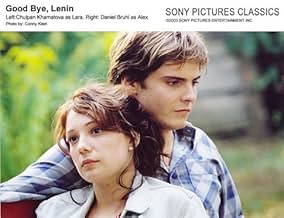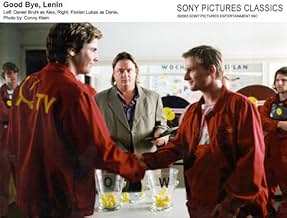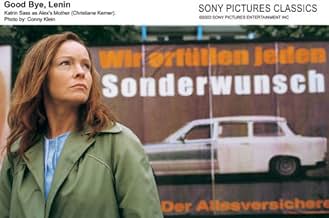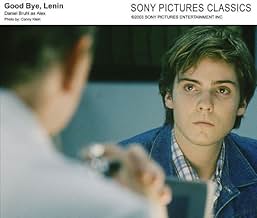IMDb-BEWERTUNG
7,7/10
155.274
IHRE BEWERTUNG
Um seine labile Mutter nach einem langen Koma vor einem verhängnisvollen Schock zu bewahren, muss ein junger Mann im Jahr 1990 vor ihr verbergen, dass ihre geliebte DDR-Nation, wie sie sie k... Alles lesenUm seine labile Mutter nach einem langen Koma vor einem verhängnisvollen Schock zu bewahren, muss ein junger Mann im Jahr 1990 vor ihr verbergen, dass ihre geliebte DDR-Nation, wie sie sie kannte, verschwunden ist.Um seine labile Mutter nach einem langen Koma vor einem verhängnisvollen Schock zu bewahren, muss ein junger Mann im Jahr 1990 vor ihr verbergen, dass ihre geliebte DDR-Nation, wie sie sie kannte, verschwunden ist.
- Nominiert für 1 BAFTA Award
- 36 Gewinne & 22 Nominierungen insgesamt
Katrin Sass
- Mutter Christiane Kerner
- (as Katrin Saß)
Nico Ledermueller
- Alex - 11 Jahre
- (as Nico Ledermüller)
Handlung
WUSSTEST DU SCHON:
- WissenswertesThe story is loosely based on the last two years of Vladimir Lenin's life, living in a controlled environment similar to what is portrayed in the film. With the justification that over-excitement might cause Lenin health problems, Joseph Stalin had printed for him one-copy edition newspapers, censored of all news about the political struggles of the time.
- PatzerDenis wears a "digital rain"-style T-shirt in 1989 because he has developed the idea himself and has come up with an idea for a film exactly like Matrix (1999), which he describes in a deleted scene (the letters are not identical to the Matrix scheme.) The joke is that the idea originated in East Germany; compare the claim in one of Denis's fake news shows that the Coca-Cola formula was invented there. It also ties in to the film's main theme of keeping people in a simulated reality.
- Zitate
Sigmund Jähn: Socialism doesn't mean live behind a Wall. Socialism means reach the others and live with the others.
- Crazy CreditsRenowned German actor Jürgen Vogel plays the chicken in the supermarket and is credited as "Das Küken" ("young chicken").
- VerbindungenFeatured in The 61st Annual Golden Globe Awards (2004)
- SoundtracksMocca-Milch-Eisbar
Written by Thomas Natschinski and Hartmut König
Ausgewählte Rezension
The destruction of the Berlin Wall in 1989 was a historically significant event not just for the people of Germany, but also for much of the rest of the world. Aside from reuniting two vastly different political systems, this remarkable incident marked a turning point for the capitalist uprising occurring within many of the other socialist states. Filmmakers worldwide have since explored the causes and effects of the German Reunification, and even today, they continue to bring new insight and a fresh perspective to an event that occurred nearly fifteen years ago. Wolfgang Becker's GOOD BYE, LENIN! is among the most recent of such films, and probably among the best of them as well.
Rather than charging head-on at a specific political standing, GOOD BYE, LENIN! uses carefully controlled satire to poke fun at the absurdities of both communist and capitalist societies. And despite criticism from gung-ho supporters of either system, Becker is careful not to take sides or appear sympathetic toward any political institution. Instead of concentrating exclusively on the governmental changes of the newly reunified Germany, he wisely opts to narrow his focus on the effects that these changes have on one particular Berlin family. By doing this, Becker is able to show the challenges of adapting to a new, unfamiliar way of life in a context that is much more personal and easier for the viewer to identify with.
The humor in GOOD BYE, LENIN! is plentiful, and Becker takes advantage of every possible opportunity to fit in a comedic moment. Even during the most somber parts of the story, the film never lets go of its astute sense of humor; and because the humor is always thought-provoking and cleverly executed, it never feels forced or gratuitous. The running joke about Alex's unremitting quest for Spreewald pickle jars and the scene where Alex's bedridden mother is perplexed by the Coca-Cola banner hanging from the building across from hers' are brilliant examples of the movie's sharp, yet sensitive wit. Aside from just being funny in themselves, these bits work doubly well because of their uses of symbolism and metaphor. The Spreewald pickles, now impossible to find because of the fall of the GDR, are representative of the `good old days' when Alex was familiar with the ways of his country and when his mother was in good health. His almost frantic search for them shows his longing to return to the way things used to be. Likewise, the unfurling of the Coca-Cola banner is the perfect embodiment of all the capitalist changes occurring within the new Germany. Once you begin to see the Coca-Cola and Burger King logos, you know that capitalism has truly grabbed hold and that there is now no escaping its embrace, for better or for worse.
GOOD BYE, LENIN! makes great use of this type of imagery to emphasize the country's transformation and to provide insight to the emotions of the main characters. A most notable instance of this is the scene where Alex's mother, a staunch supporter of socialism, finally leaves her home to a very different East Germany than the one she remembered. She then looks to the sky and sees a helicopter airlifting a statue of Lenin off the top of a building. As Lenin is being hauled away, his outstretched arm seems to be reaching out to her, as if he's calling out for her to rescue him and his ideals, and restore her beloved country.
Alex's complex lies and meticulous attempts at preserving the past for his mother are innocent enough at first, but eventually they begin to take on a life of their own. The lengths he goes through to maintain the atmosphere of a bygone era and keep his mother happy are indeed funny, but they are also very tragic as well. Though the lies do work temporarily to keep his mother oblivious to the events outside of her apartment, they also plunge Alex and his family into such a deep pool of deception that they eventually lose their closeness with one another. The stress of keeping up the façade becomes unbearable for Alex, and at one point he even wishes his mother were dead.
Other humor was purely cultural, and probably only appreciable by people who have actually experienced the Reunification. I noticed this only because of the native German family sitting in front of me at the theater, laughing in unison at dialogue and images that didn't look to me like they were meant to be interpreted as humorous. But still, even though the older generations of German people are likely to get more out of this movie, it is still a hilarious, heartfelt, and incredibly rewarding experience for people of all cultures and ethnicities.
Rather than charging head-on at a specific political standing, GOOD BYE, LENIN! uses carefully controlled satire to poke fun at the absurdities of both communist and capitalist societies. And despite criticism from gung-ho supporters of either system, Becker is careful not to take sides or appear sympathetic toward any political institution. Instead of concentrating exclusively on the governmental changes of the newly reunified Germany, he wisely opts to narrow his focus on the effects that these changes have on one particular Berlin family. By doing this, Becker is able to show the challenges of adapting to a new, unfamiliar way of life in a context that is much more personal and easier for the viewer to identify with.
The humor in GOOD BYE, LENIN! is plentiful, and Becker takes advantage of every possible opportunity to fit in a comedic moment. Even during the most somber parts of the story, the film never lets go of its astute sense of humor; and because the humor is always thought-provoking and cleverly executed, it never feels forced or gratuitous. The running joke about Alex's unremitting quest for Spreewald pickle jars and the scene where Alex's bedridden mother is perplexed by the Coca-Cola banner hanging from the building across from hers' are brilliant examples of the movie's sharp, yet sensitive wit. Aside from just being funny in themselves, these bits work doubly well because of their uses of symbolism and metaphor. The Spreewald pickles, now impossible to find because of the fall of the GDR, are representative of the `good old days' when Alex was familiar with the ways of his country and when his mother was in good health. His almost frantic search for them shows his longing to return to the way things used to be. Likewise, the unfurling of the Coca-Cola banner is the perfect embodiment of all the capitalist changes occurring within the new Germany. Once you begin to see the Coca-Cola and Burger King logos, you know that capitalism has truly grabbed hold and that there is now no escaping its embrace, for better or for worse.
GOOD BYE, LENIN! makes great use of this type of imagery to emphasize the country's transformation and to provide insight to the emotions of the main characters. A most notable instance of this is the scene where Alex's mother, a staunch supporter of socialism, finally leaves her home to a very different East Germany than the one she remembered. She then looks to the sky and sees a helicopter airlifting a statue of Lenin off the top of a building. As Lenin is being hauled away, his outstretched arm seems to be reaching out to her, as if he's calling out for her to rescue him and his ideals, and restore her beloved country.
Alex's complex lies and meticulous attempts at preserving the past for his mother are innocent enough at first, but eventually they begin to take on a life of their own. The lengths he goes through to maintain the atmosphere of a bygone era and keep his mother happy are indeed funny, but they are also very tragic as well. Though the lies do work temporarily to keep his mother oblivious to the events outside of her apartment, they also plunge Alex and his family into such a deep pool of deception that they eventually lose their closeness with one another. The stress of keeping up the façade becomes unbearable for Alex, and at one point he even wishes his mother were dead.
Other humor was purely cultural, and probably only appreciable by people who have actually experienced the Reunification. I noticed this only because of the native German family sitting in front of me at the theater, laughing in unison at dialogue and images that didn't look to me like they were meant to be interpreted as humorous. But still, even though the older generations of German people are likely to get more out of this movie, it is still a hilarious, heartfelt, and incredibly rewarding experience for people of all cultures and ethnicities.
Top-Auswahl
Melde dich zum Bewerten an und greife auf die Watchlist für personalisierte Empfehlungen zu.
- How long is Good Bye Lenin!?Powered by Alexa
Details
- Erscheinungsdatum
- Herkunftsland
- Offizielle Standorte
- Sprachen
- Auch bekannt als
- 79 qm DDR
- Drehorte
- Produktionsfirmen
- Weitere beteiligte Unternehmen bei IMDbPro anzeigen
Box Office
- Budget
- 4.800.000 € (geschätzt)
- Bruttoertrag in den USA und Kanada
- 4.064.200 $
- Eröffnungswochenende in den USA und in Kanada
- 57.968 $
- 29. Feb. 2004
- Weltweiter Bruttoertrag
- 79.316.957 $
- Laufzeit2 Stunden 1 Minute
- Farbe
- Sound-Mix
- Seitenverhältnis
- 1.85 : 1
Zu dieser Seite beitragen
Bearbeitung vorschlagen oder fehlenden Inhalt hinzufügen


































